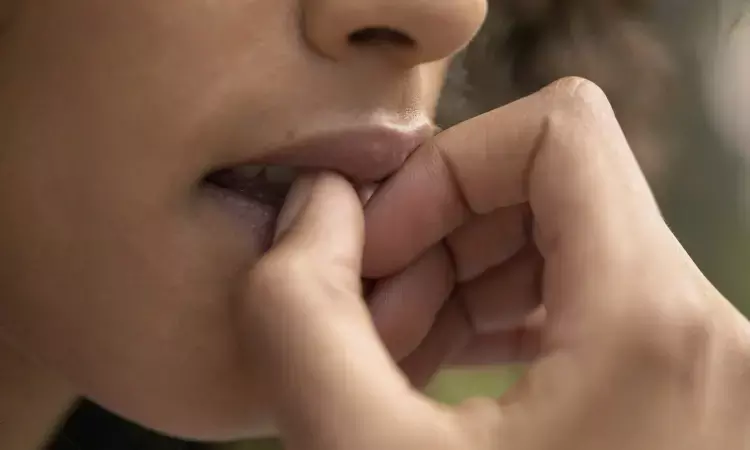- Home
- Medical news & Guidelines
- Anesthesiology
- Cardiology and CTVS
- Critical Care
- Dentistry
- Dermatology
- Diabetes and Endocrinology
- ENT
- Gastroenterology
- Medicine
- Nephrology
- Neurology
- Obstretics-Gynaecology
- Oncology
- Ophthalmology
- Orthopaedics
- Pediatrics-Neonatology
- Psychiatry
- Pulmonology
- Radiology
- Surgery
- Urology
- Laboratory Medicine
- Diet
- Nursing
- Paramedical
- Physiotherapy
- Health news
- Fact Check
- Bone Health Fact Check
- Brain Health Fact Check
- Cancer Related Fact Check
- Child Care Fact Check
- Dental and oral health fact check
- Diabetes and metabolic health fact check
- Diet and Nutrition Fact Check
- Eye and ENT Care Fact Check
- Fitness fact check
- Gut health fact check
- Heart health fact check
- Kidney health fact check
- Medical education fact check
- Men's health fact check
- Respiratory fact check
- Skin and hair care fact check
- Vaccine and Immunization fact check
- Women's health fact check
- AYUSH
- State News
- Andaman and Nicobar Islands
- Andhra Pradesh
- Arunachal Pradesh
- Assam
- Bihar
- Chandigarh
- Chattisgarh
- Dadra and Nagar Haveli
- Daman and Diu
- Delhi
- Goa
- Gujarat
- Haryana
- Himachal Pradesh
- Jammu & Kashmir
- Jharkhand
- Karnataka
- Kerala
- Ladakh
- Lakshadweep
- Madhya Pradesh
- Maharashtra
- Manipur
- Meghalaya
- Mizoram
- Nagaland
- Odisha
- Puducherry
- Punjab
- Rajasthan
- Sikkim
- Tamil Nadu
- Telangana
- Tripura
- Uttar Pradesh
- Uttrakhand
- West Bengal
- Medical Education
- Industry
N-acetylcysteine effective for treating skin picking disorder: Study

N-acetylcysteine is useful in treating skin picking disorder, suggests a study published in the Journal of the American Academy of Dermatology.
Skin picking disorder (SPD) is also called the Excoriation disorder. It is characterized by repetitive skin manipulation causing visible tissue damage and impairment in social functioning.
Individuals may pick at healthy skin, minor skin irregularities (e.g., pimples or calluses), lesions, or scabs. This condition is generally chronic in nature, occurring in time intervals, with periods of remission alternating with periods of greater symptom intensity. It is common for individuals with this disorder to spend significant amounts of time, sometimes even several hours a day, on this behavior.
None of the current treatment modalities provide a 100% cure rate. However, many studies have given evidence that bolsters the use of N-acetylcysteine (NAC) for skin picking disorder. While the greatest level of proof comes from a randomized control trial (RCT) with psychiatric endpoints evaluated by psychiatrists.
A study was conducted by a group of researchers U.S.A researchers, to reinstate the effectiveness of N-acetylcysteine for skin picking disorder.
The researchers carried out a single-center, retrospective cohort study. They selected a total of 28 patients with various diagnoses like, skin picking, acne excoriée, or neurodermatitis, which were treated with N-acetylcysteine.
However, out of the total 28 patients, only 13 patients completed an adequate trial, defined as a minimum dose of 600 mg twice daily for 3 consecutive months.
The results of the study are as follows:
Ø 61.5% of the total 13 patients demonstrated improvement on physical exam.
Ø While the most common side effect was gastrointestinal upset reported in 7.1% of the total 13 participants.
Ø The discontinuation rate before completion of an adequate trial was 53.6%, with 40% of patients discounting treatment due to a lack of response.
Thus, the researchers concluded that N-acetylcysteine delivers promising results in the treatment of skin picking disorder when treatment is continued for at least 3 months.
Reference:
A study titled, "Evidence for N-Acetylcysteine Efficacy for Skin Picking Disorder" by published in the Journal of the American Academy of Dermatology
DOI:https://doi.org/10.1016/j.jaad.2021.06.874
Dr. Shravani Dali has completed her BDS from Pravara institute of medical sciences, loni. Following which she extensively worked in the healthcare sector for 2+ years. She has been actively involved in writing blogs in field of health and wellness. Currently she is pursuing her Masters of public health-health administration from Tata institute of social sciences. She can be contacted at editorial@medicaldialogues.in.
Dr Kamal Kant Kohli-MBBS, DTCD- a chest specialist with more than 30 years of practice and a flair for writing clinical articles, Dr Kamal Kant Kohli joined Medical Dialogues as a Chief Editor of Medical News. Besides writing articles, as an editor, he proofreads and verifies all the medical content published on Medical Dialogues including those coming from journals, studies,medical conferences,guidelines etc. Email: drkohli@medicaldialogues.in. Contact no. 011-43720751


